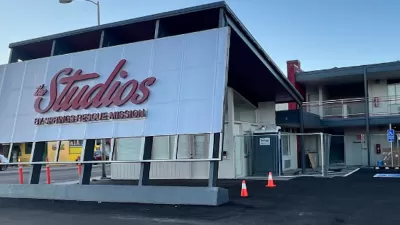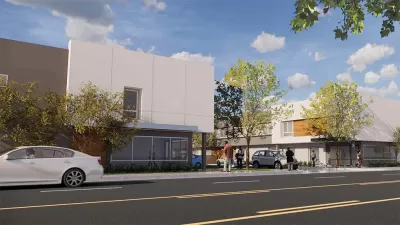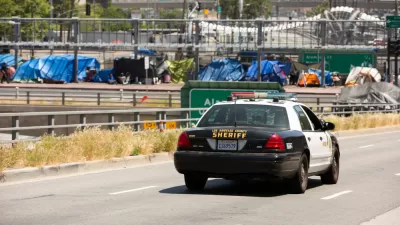While the Golden State has awarded $800 million in funds for 'Project Roomkey,' a bill passed by the New York State Senate languishes in the governor's office.

Martin Z. Braun reports on what some critics call New York's failure to seize the "once-in-a-generation opportunity to quickly expand affordable housing" afforded by the drop in hotel occupancy during the pandemic. "New York is proposing to spend too little, and at too slow a pace" to make a significant impact.
A bill approved by state lawmakers in June, known as the "Housing Our Neighbors with Dignity Act" has yet to be signed by Governor Cuomo. Meanwhile, the bill's language "doesn’t override local zoning rules that constrain conversions in hotel-rich neighborhoods like the Garment District and Long Island City" and only allocates $100 million to the program, "a compromise sum which advocates say is not enough to capitalize on the scale of opportunity." "California, by contrast, has already awarded $800 million for local governments to purchase hotels and motels and convert them into permanent housing for people at risk of or experiencing homelessness."
At the same time, "the window for taking any action may be closing" as hotel guests return and hotel owners are less motivated to sell their assets at affordable prices for non-profit housing developers. "Besides the higher hotel acquisition prices, there’s a provision in the New York bill that would require converted hotel units to have kitchenettes and private bathrooms, which would raise costs further. And it doesn’t ease zoning rules on hotel conversions in manufacturing districts, where about 160 of the city’s 720 hotels are located." Developers, says Meghan Altidor, a partner in the law firm Nixon Peabody LLP’s affordable housing and real estate practice, are "feeling as if there needs to be a funding source for acquiring the hotels and converting them into affordable housing. That seems to be the biggest missing piece."
FULL STORY: New York May Miss the Window to Convert Hotels to Affordable Housing

Maui's Vacation Rental Debate Turns Ugly
Verbal attacks, misinformation campaigns and fistfights plague a high-stakes debate to convert thousands of vacation rentals into long-term housing.

Planetizen Federal Action Tracker
A weekly monitor of how Trump’s orders and actions are impacting planners and planning in America.

San Francisco Suspends Traffic Calming Amidst Record Deaths
Citing “a challenging fiscal landscape,” the city will cease the program on the heels of 42 traffic deaths, including 24 pedestrians.

Defunct Pittsburgh Power Plant to Become Residential Tower
A decommissioned steam heat plant will be redeveloped into almost 100 affordable housing units.

Trump Prompts Restructuring of Transportation Research Board in “Unprecedented Overreach”
The TRB has eliminated more than half of its committees including those focused on climate, equity, and cities.

Amtrak Rolls Out New Orleans to Alabama “Mardi Gras” Train
The new service will operate morning and evening departures between Mobile and New Orleans.
Urban Design for Planners 1: Software Tools
This six-course series explores essential urban design concepts using open source software and equips planners with the tools they need to participate fully in the urban design process.
Planning for Universal Design
Learn the tools for implementing Universal Design in planning regulations.
Heyer Gruel & Associates PA
JM Goldson LLC
Custer County Colorado
City of Camden Redevelopment Agency
City of Astoria
Transportation Research & Education Center (TREC) at Portland State University
Jefferson Parish Government
Camden Redevelopment Agency
City of Claremont





























